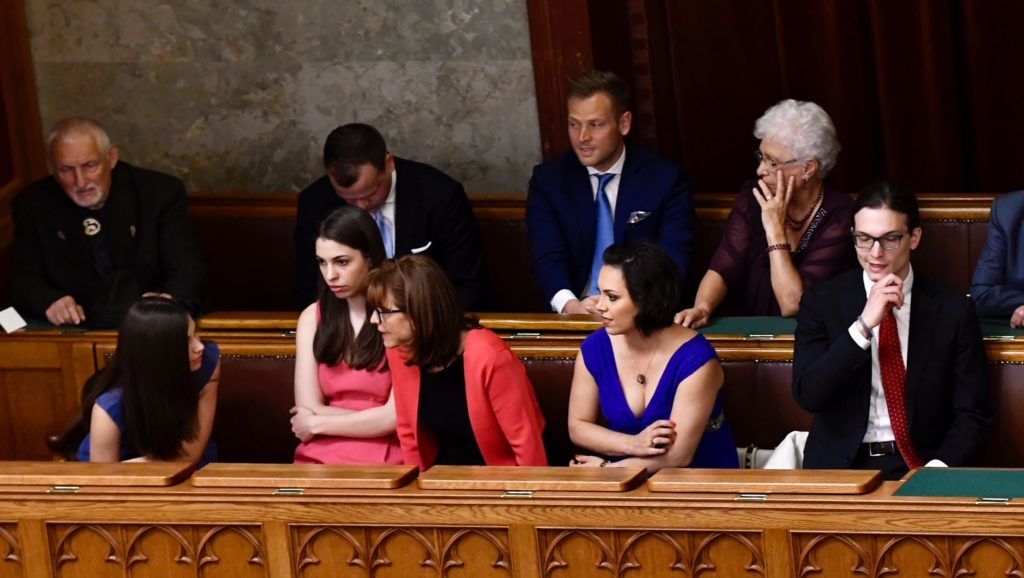Although the Hungarian law on MPs’ asset declaration has long been criticized by many for inefficiency, the Hungarian public has often been left stunned by the wealth of the political elite revealed in asset declarations. Now, Fidesz MPs submitted a bill that plans to disperse the last safeguards that serves some transparency of the wealth of politicians.

K-Monitor has always been of the view that the current scheme of asset declarations is not efficient, but it gives the press some hints for shedding light on politicians’ trickeries and hypocrisy, at least. Public funds watchdogs such as K-Monitor, Átlátszó and TI Hungary proposed a set of reforms almost a decade ago, however, a reform of the asset declaration scheme has never been implemented.
A bill by Fidesz MPs now plans to bring significant changes: it would simply abolish the statutory obligation of MPs and high profile government officials to declare their assets. On 27 June 2022, MPs from the governing party submitted a bill to disperse the scheme of asset declarations. They justified the reform as necessary
‘(a)s a result of recent discussions with international bodies, it has emerged that the level of transparency of the asset declaration system for Hungarian MPs should be considered to be further aligned with European standards.’
It might seem surprising that this time the hawkish Hungarian government has taken up the international organizations' recommendations on transparency. But there is no reason for optimism, it is again merely a cynical step taken by the government. Let's first recall the criticisms that European organizations have made reagarding the Hungarian asset declaration system in recent years.
The European Commission’s annual rule of law country report concerned the efficiency of the anti-corruption framework, including the asset declaration scheme. The most recent report, published last summer, also covers asset declarations by MPs. While the EC has not criticized the declarations by their statutory content, it has drawn attention to the lack of effective controls to ensure the authenticity of the declarations, having said that
‘Hungary has an extensive asset disclosure system, however, concerns remain regarding the lack of systematic checks and insufficient oversight of asset and interest declarations’
In its 2015 fourth evaluation round, GRECO's expert group, while calling the Hungarian framework be ‘introduced with the good intention,’ criticized it for its lack of enforceable transparency:
‘the content of the declarations is not checked by any authority ex officio, unless a substantiated complaint has been initiated; public scrutiny of the forms is difficult as these are often handwritten and/or scanned documents; declarations concerning relatives are not public at all and the authorities’ scrutiny of these is only done in relation to a complaint against an MP.’
As nothing has changed since then, GRECO has maintained its concerns in 2020. To sum up the international criticism, neither the EU nor the Council of Europe criticized the mandatory content of the asset declarations, but the lack of transparency and procedures that would provide controls and sanctions.
In the explanatory memorandum to the bill, the government MPs therefore falsely claim that ‘international institutions’ and 'European standards' have been considered. In fact, they would further weaken the statutory scheme of declarations, along the lines of the much-criticized German or EU declarations, while not even introducing the sanctions that exist in these jurisdictions. Eventually, the worst combination of the German and Hungarian declaration systems seems to be introduced soon.
What is Coming?
1) Duty to Declare: Only If the MP Considers it Necessary
Under the prevailing law, by 31 January each year, MPs had to submit their asset declaration, which is published on the Parliament's website. The bill would simply dissolve the annual basis and the duty to declare after the termination of the MP's mandate. It would be sufficient for MPs to make a declaration at the time of taking up their mandate - only once in four years. After that, they would no longer have to make a regular declaration. However, if MPs think that there has been a change in the information declared previously, they must notify the competent parliamentary committee. The proposal therefore gives a much greater role to MPs’ self-assessment.
2) The Invisible Family
Until now, not only MPs, but also their spouses, partners and children living in the same household had to make a declaration. A parliamentary committee had to archive the declarations for one year after the end of the MPs’ mandate. The family declaration had the same format as that of MPs. The only difference was that the relatives' declarations were not - even partially - public. The lack of publicity was also criticized by GRECO in the report cited above.

PM Orbán's Family in the Building of the Hungarian Parliament, Photo: 24.hu
However, the bill would not increase the transparency of relatives' fortune, but on the contrary: it would completely terminate the statutory obligation for family members to declare their assets. In addition, MPs will no longer have to declare who they live with at all.
3) Broad Categories of Income Only
As in the case of MEPs' declaration, Hungarian MPs will only have to classify themselves in an income range when they take up their mandate, without having to specify the exact amount of their income.
In the future it will no longer be necessary to declare real estates and other kinds of properties MPs have. Obviously there will be no information on how or under what title they purchased them.
MPs can easily choose not to declare anything as their assets do not have to be declared at all and their traceable source of income is only their parliamentary salary.
The proposed change also fails to ensure that income declared are cross-checked with public records, for example, with data collected by the tax authority.
MPs would be required to declare their occasional earnings where their annual income exceeds HUF 2 million (EUR 5000). Occasional earnings of less than HUF 2 million per year should not be declared at all.
4) MPs Might Declare How Influential They Consider Themselves To Be
Up to now, MPs have had to state the value and the share of their business interests. They also had to indicate whether the company they have interests in receives government or EU funding. If the bill is passed, there will be no need to declare shares in companies at all. The MPs will only have to declare
- ‘interests’ which they consider to be likely to influence their work, or
- if they have a dominant influence in the company, and the MP can essentially control the company alone.
As the Hungarian company registry is still public, in theory, it is possible to check the business relations of MPs. However, anyone who wants to understand the business relations of MPs will need to do some extra research, and pay a fee to one of the private company registry providers. Not to mention foreign economic interests, of which no trace might be found in Hungary without the MPs’ declaration.
5) Who Are Hungarian MPs Beholden To?
Under the current rules, MPs have to declare their debts in detail, so that it is clear to whom they are indebted and for how much money. In the future, they will not have to declare this at all, although they can list their debts under ‘other financial interests’ if they wish. However, they only need to do so if they consider that the debt might influence the performance of their duties. It is therefore highly likely that not only property acquisitions, but also the source of wealth - often attributed to a family loan or gift - will no longer be publicly traceable.
Summing up, this means that the system of asset declarations will be abolished in Hungary and only its elements on income and financial interest will remain in place in an emptied out form.
‘As the same framework is used in Germany, perhaps international debates can be avoided this time.’
According to Fidesz MP Máté Kocsis, the draftsman of the bill, the proposed changes were deliberately formed upon the German legislation. However, the Fidesz politician did not mention two important aspects. Although the wording of the MPs' declaration has indeed been copied from the MEPs’ Code of Conduct, the mechanism to ensure the authenticity of the declarations have not been adapted to the EU model, or changed at all. In a nutshell, the system that both the EC and GRECO have criticized for its dysfunctionality will not be changed but will become even worse. MP Kocsis copied those German federal laws that the EC had criticized in its rule of law report of 2021, and GRECO in its evaluations in 2014 and then in 2020: rules lacking transparency regarding company shares and family wealth.
K-Monitor strives against corruption and promotes the transparency of public spending in Hungary. Support Us!
Címkék: english
Szólj hozzá!
A bejegyzés trackback címe:
Kommentek:
A hozzászólások a vonatkozó jogszabályok értelmében felhasználói tartalomnak minősülnek, értük a szolgáltatás technikai üzemeltetője semmilyen felelősséget nem vállal, azokat nem ellenőrzi. Kifogás esetén forduljon a blog szerkesztőjéhez. Részletek a Felhasználási feltételekben és az adatvédelmi tájékoztatóban.





